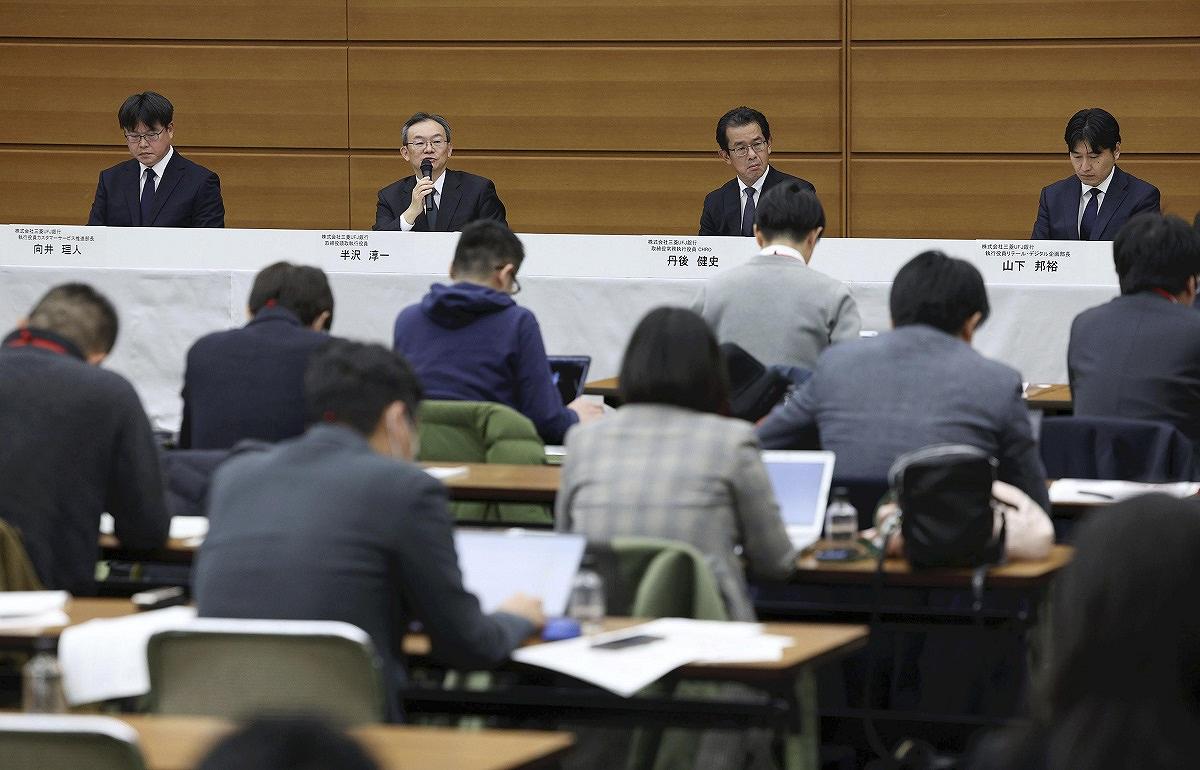Thefts From MUFG Safe Deposit Boxes Shake Confidence; Current System Makes It Difficult to Notice Missing Items

MUFG Bank President Junichi Hanzawa, second from left, and others hold a press conference on Monday in Tokyo regarding the thefts by a former employee.
21:00 JST, December 17, 2024
A former MUFG Bank employee’s thefts of customer assets worth more than ¥1 billion from safe deposit boxes has highlighted the inadequacy of the bank’s management system, which allowed a single employee to use a spare key.
A series of scandals have been unearthed recently in the financial industry, shaking public trust. Harsh eyes are being turned on the industry, demanding that it prevent a recurrence.
System failed
“My greatest responsibility is to formulate and implement measures to prevent a recurrence. I will consider disciplinary actions, including toward myself, while clarifying the true cause of the problem,” MUFG Bank President Junichi Hanzawa said Monday at a press conference in Tokyo. Hanzawa bowed deeply for about 10 seconds to apologize.
Executive officer Masato Mukai, who oversees the customer service department, said, “We have damaged the trust of customers in our safe deposit boxes, and we are deeply sorry for this.”
The former employee, who is in her 40s, held the positions of sales manager and acting branch manager. The problem was first discovered at the end of October when a customer noticed that some of their cash was missing. Since then, dozens of customers have come forward to report possible losses. The total amount may increase.
The subsidiary of the bank that manages the safe deposit boxes carries out regular inspections every six months, and there was also a system in place to record entrances and exits. However, the theft went undetected for 4½ years. The bank also failed to adequately check the security cameras.
“We haven’t had this kind of thing happen in the past, so we lacked risk awareness,” Mukai said.
This remark illustrated the insufficient crisis management on the part of the bank.
Blind spot
Safe deposit boxes are used to store such valuables as land deeds and securities, to be prepared for such situations as natural disasters, and many banks offer this service. MUFG charges between ¥15,000 and ¥30,000 annually to use such boxes, which are rented by about 130,000 customers.
As a rule, even the bank’s staff cannot look inside the boxes for privacy reasons, with the result that “it’s difficult to notice if something is missing,” according to a person close to the matter.
Even before the discovery at the end of October, the bank’s Nerima branch had received inquiries from customers who wanted to check the safe deposit boxes. However, the now-dismissed female employee had returned the stolen goods and covered up the theft, delaying the discovery.
The bank made a public announcement about the thefts on Nov. 22, but it took about three weeks to explain the situation to the public, leaving the holders of safe deposit boxes increasingly anxious.
Asked about this gap, Hanzawa said: “We decided that we would prioritize dealing with customers first, and then explain the situation [to the public] when we have an idea what had happened, to help dispel [our customers’] anxieties.”
Countermeasures
MUFG said it would revise the system so that the spare keys, which had been managed by each branch, are centrally managed by its three headquarters in Tokyo, Nagoya and Osaka. Also, unlocking safe deposit boxes will require the presence of multiple bank employees.
There are also other issues surrounding safe deposit boxes — for example, they could facilitate such crimes as tax evasion. Also, the profitability of such boxes is low compared to the administrative burden, and some regional financial institutions have already begun to terminate their services at certain branches.
A growing number of customers are canceling their use on such occasions as receiving an inheritance. Renters of safe deposit boxes at MUFG have decreased by 30% over the past five years.
“There are some inherent problems with the structure of the safe deposit box business,” said lawyer Hideyuki Shiina, who previously worked for a megabank. “Perhaps it’s time for the industry as a whole to take a fresh look at the service.”
Top Articles in Business
-

Prudential Life Insurance Plans to Fully Compensate for Damages Caused by Fraudulent Actions Without Waiting for Third-Party Committee Review
-

Narita Airport, Startup in Japan Demonstrate Machine to Compress Clothes for Tourists to Prevent People from Abandoning Suitcases
-

Japan, U.S. Name 3 Inaugural Investment Projects; Reached Agreement After Considerable Difficulty
-

Toyota Motor Group Firm to Sell Clean Energy Greenhouses for Strawberries
-

SoftBank Launches AI Service for Call Centers That Converts Harsh Customer Voices into Softer Voices
JN ACCESS RANKING
-

Japan PM Takaichi’s Cabinet Resigns en Masse
-

Japan Institute to Use Domestic Commercial Optical Lattice Clock to Set Japan Standard Time
-

Israeli Ambassador to Japan Speaks about Japan’s Role in the Reconstruction of Gaza
-

Man Infected with Measles Reportedly Dined at Restaurant in Tokyo Station
-

Videos Plagiarized, Reposted with False Subtitles Claiming ‘Ryukyu Belongs to China’; Anti-China False Information Also Posted in Japan




















